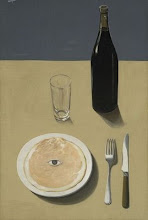Modern Athens has nothing more in common with the antique city covered over, absorbed, extended beyond measure. The monuments and sites (Agora, Acropolis) which enable to locate ancient Greece are only places of tourist consumption and aesthetic pilgrimage. Yet the organizational core of the city remains very strong. Its surroundings of new neighbourhoods and semi-shanty towns inhabited by uprooted and disorganized people confer it an exorbitant power. This almost shapeless gigantic agglomeration enables the holders of decision-making centres to carry out the worst political ventures. All the more so that the economy of the country closely depends on this network: property speculation, the "creation" of capitals by this means, investments of these capitals into construction and so on and so forth. It is this fragile network, always in danger of breaking, which defines a type of urbanization, without or with a weak industrialization, but with a rapid extension of the agglomeration, of property and speculation; a prosperity falsely maintained by the network.
A global strategy, that is, what is already an unitary system and total planning, is outlined through these various tendencies. Some will put into practice and will concretize a directed consumer society. They will build not only commercial centres, but also centres of privileged consumption: the renewed city. They will by making "legible" an ideology of happiness through consumption, joy by planning adapted to its new mission. This planning programmes a daily life generating satisfactions - (especially for receptive and participating women). A programmed and computerized consumption will become the rule and norm for the whole society. Others will erect decision-making centres, concentrating the means of power: information, training, organization, operation. And still: repression (constraints, including violence) and persuasion (ideology and advertising). Around these centres will be apportioned on the ground, in a dispersed order, according to the norms of foreseen constraints, the peripheries, de-urbanized urbanization. All the conditions come together thus for a perfect domination, for a refined exploitation of people as producers, consumers of products, consumers of space.
Henri Lefebvre
1901 - 1991


![[...]](https://blogger.googleusercontent.com/img/b/R29vZ2xl/AVvXsEjeNC2Kyxd34r2LuofHe9-vdXHeHwG3_2NhVmIOTlK2moU0Q4R7taMlS8iMmQgEl1-NdaRsPrLdREzfQZYKfUgjslwLZUZe67dAfFBREu-YRx6WGX-vAUt5eJT4_-lFwT4dGzGCQQ/s220/11798115_858304687558226_1857652538_n.jpg)














































